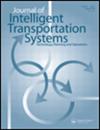ABAFT:一种基于自适应权重的融合技术,用于基于不同置信度和空间覆盖的多源数据的旅行时间估计
IF 2.8
3区 工程技术
Q3 TRANSPORTATION
Journal of Intelligent Transportation Systems
Pub Date : 2024-11-01
DOI:10.1080/15472450.2023.2228198
引用次数: 0
摘要
交通监控系统的发展提供了来自多个传感器的丰富交通数据。对数据进行融合有可能提高行程时间估计的质量。它还为交通观测提供了更好的时空覆盖。然而,每个传感器独特的数据收集过程导致不同来源之间的覆盖范围和数据质量差异带来融合挑战。这些因素决定了在融合不同类型的数据时应考虑的置信度。为此,本文提出了一种基于自适应权重的融合技术(ABAFT),该技术将数据的空间覆盖和质量或置信度作为构建权重的因素。提议的ABAFT在不同的场景下测试了来自城市主干道的合成GPS和蓝牙MAC扫描仪数据。结果表明,与单传感器估计相比,ABAFT估计精度提高10%以上,可靠性提高8%以上。它也比简单平均和基于标准误差的核聚变要好4%左右。ABAFT很容易在运输机构可用的多个信息来源上实施,以实现单一的事实点。本文章由计算机程序翻译,如有差异,请以英文原文为准。
ABAFT: an adaptive weight-based fusion technique for travel time estimation using multi-source data with different confidence and spatial coverage
The evolution of traffic monitoring systems provides rich traffic data from multiple sensors. Fuzing the data has the potential to enhance the quality of travel time estimation. It also provides better spatial-temporal coverage in traffic observations. However, each sensor’s unique data collection process results in fusion challenges with respect to the coverage and data quality differences between various sources. These factors determine the degree of confidence that should be considered when fuzing different types of data. To this end, this paper proposes an adaptive weight-based fusion technique (ABAFT) that considers data spatial coverage and quality or confidence as the factors constructing the weight. The proposed ABAFT was tested using different scenarios on synthetic GPS and Bluetooth MAC Scanners data from an urban arterial corridor. The results show that the ABAFT can increase the travel time estimation accuracy by over 10%, and reliability by over 8% compared to the single sensor estimators. It also outperforms the simple average and standard-error-based fusion by around 4%. ABAFT is easy to be implemented on multiple sources of information available to transport agencies for a single point of truth.
求助全文
通过发布文献求助,成功后即可免费获取论文全文。
去求助
来源期刊
CiteScore
8.80
自引率
19.40%
发文量
51
审稿时长
15 months
期刊介绍:
The Journal of Intelligent Transportation Systems is devoted to scholarly research on the development, planning, management, operation and evaluation of intelligent transportation systems. Intelligent transportation systems are innovative solutions that address contemporary transportation problems. They are characterized by information, dynamic feedback and automation that allow people and goods to move efficiently. They encompass the full scope of information technologies used in transportation, including control, computation and communication, as well as the algorithms, databases, models and human interfaces. The emergence of these technologies as a new pathway for transportation is relatively new.
The Journal of Intelligent Transportation Systems is especially interested in research that leads to improved planning and operation of the transportation system through the application of new technologies. The journal is particularly interested in research that adds to the scientific understanding of the impacts that intelligent transportation systems can have on accessibility, congestion, pollution, safety, security, noise, and energy and resource consumption.
The journal is inter-disciplinary, and accepts work from fields of engineering, economics, planning, policy, business and management, as well as any other disciplines that contribute to the scientific understanding of intelligent transportation systems. The journal is also multi-modal, and accepts work on intelligent transportation for all forms of ground, air and water transportation. Example topics include the role of information systems in transportation, traffic flow and control, vehicle control, routing and scheduling, traveler response to dynamic information, planning for ITS innovations, evaluations of ITS field operational tests, ITS deployment experiences, automated highway systems, vehicle control systems, diffusion of ITS, and tools/software for analysis of ITS.

 求助内容:
求助内容: 应助结果提醒方式:
应助结果提醒方式:


